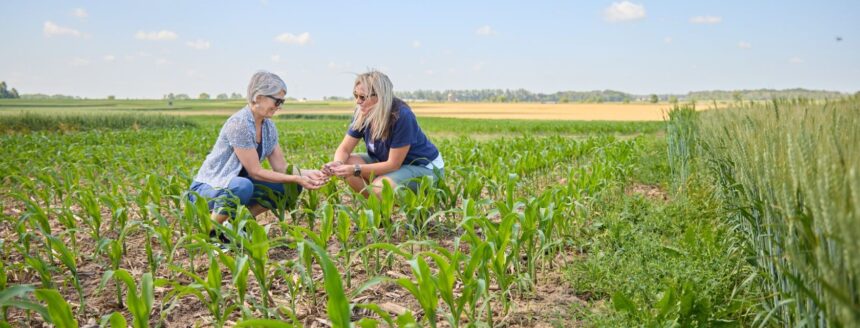The morning frost still clung to the research fields at the University of Guelph when Agriculture Minister Lisa Thompson announced what many in the sector are calling a crucial lifeline for Ontario’s food future. Standing alongside university researchers and local farmers, Thompson unveiled $5.4 million in provincial funding aimed at strengthening the backbone of Ontario’s agricultural innovation ecosystem.
“This investment isn’t just about research papers gathering dust on shelves,” Thompson told the crowd of about 70 stakeholders gathered at the university’s renowned agricultural campus. “It’s about ensuring that when climate challenges hit our food systems, Ontario families still have affordable, locally-grown food on their tables.”
The funding package, part of Ontario’s broader Agri-Food Research Initiative, targets research that bridges immediate farm-level challenges with longer-term food security concerns. University of Guelph, often called “Canada’s Food University,” will distribute the funds across 21 projects focusing on everything from crop resilience to digital farming technologies.
For third-generation dairy farmer Marissa Leblanc from Wellington County, the announcement represents more than just numbers on a government press release. “We’ve seen three once-in-a-century floods in the past decade alone,” Leblanc explained as we walked through her family’s operation. “The research coming out of Guelph has already helped us adapt our drainage systems, but we need solutions that work five, ten years down the road.”
According to Statistics Canada‘s most recent agricultural census, Ontario’s agri-food sector contributes over $47 billion annually to the provincial economy and supports more than 860,000 jobs. Yet changing weather patterns and market pressures have pushed farm bankruptcies up 12% over the last reporting period.
The funding decision comes at a politically sensitive moment for Premier Doug Ford’s government, which has faced criticism from both environmental advocates and agricultural groups for its handling of farmland preservation policies. Last month’s controversy over the rezoning of 2,000 acres of prime agricultural land near Milton still echoes in provincial discourse.
Dr. Malcolm Campbell, vice-president of research at the University of Guelph, emphasized that the university’s approach will prioritize practical applications. “Our researchers don’t just work in labs,” Campbell noted. “They’re in the fields alongside farmers, ensuring that innovations actually solve real problems facing our food producers.”
The funding allocation breaks down into several key research streams. Approximately $1.8 million will support climate adaptation research, while $1.2 million targets food processing innovations. The remaining funds will be distributed across livestock health initiatives, soil health improvements, and market development strategies.
Opposition agriculture critic John Vanthof called the investment “necessary but insufficient” in a statement released hours after the announcement. “While we welcome any support for our agricultural researchers, this funding merely restores what was cut from the sector in 2022,” Vanthof said, referencing the previous budget cycle’s reduction in agricultural research allocations.
When pressed on this criticism, Minister Thompson defended the government’s overall approach. “We’re making strategic investments where they’ll have the greatest impact,” she countered. “This government understands that farmers need practical solutions, not political talking points.”
The funding announcement reflects a growing consensus among policy experts that food security deserves greater attention in provincial planning. Dr. Evan Fraser, director of the Arrell Food Institute at Guelph, has been advocating for this shift for years.
“We’re seeing a perfect storm of challenges hitting our food systems,” Fraser explained during a phone interview from his office. “Climate disruption, supply chain vulnerabilities exposed during COVID, and changing consumer expectations are all converging. This funding acknowledges that reality.”
For the average Ontario shopper, the research impact might not be immediately visible in grocery store aisles. But Fraser suggests that within 2-3 years, consumers could see the benefits through more resilient local food supplies and potentially stabilized prices for certain commodities.
The provincial investment comes as federal agricultural policy undergoes its own transformation. Agriculture and Agri-Food Canada recently signaled a shift toward climate-resilient farming practices in its policy framework, creating what some observers call a rare moment of federal-provincial alignment on agricultural priorities.
At Traynor Family Farms near Fergus, where apple production has been challenged by increasingly unpredictable spring frosts, owner James Traynor expressed cautious optimism about the research direction. “We need practical tools we can implement without breaking the bank,” Traynor said while inspecting this season’s Honey Crisp crop. “If this research helps develop better frost protection methods or varieties that can handle weather swings, that’s something tangible for operations like mine.”
As the afternoon sun warmed the research plots at Guelph, the conversation among farmers and researchers shifted from policy announcements to the practical challenges of the coming growing season. That transition from political promise to practical implementation remains the true test for any government funding announcement – a reality that Minister Thompson acknowledged in her closing remarks.
“The true measure of today’s announcement won’t be found in press releases,” she concluded. “It will be measured in stronger farms, more resilient food systems, and the continued strength of Ontario’s agricultural communities for generations to come.”
Whether this investment delivers on that promise remains to be seen, but for today at least, Ontario’s agricultural research community has something that’s been in short supply recently – a reason for optimism about the future.






